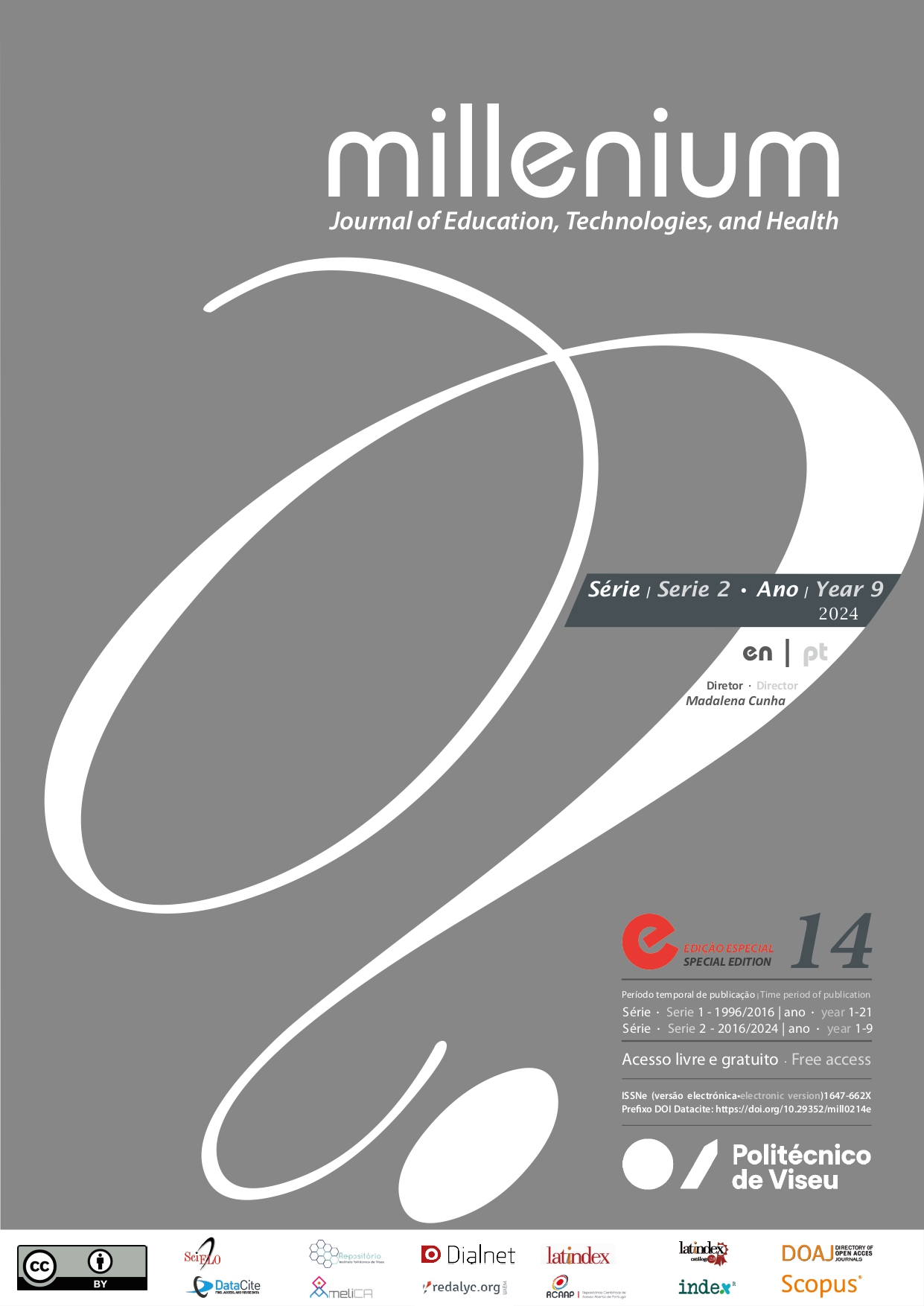Caring for the family with one of its members with dementia according to the MDAIF
DOI:
https://doi.org/10.29352/mill0214e.32665Keywords:
dementia; nuclear family; family health; nursing processAbstract
Introduction: The World Health Organization [WHO] (2012) identifies dementia as a growing public health problem, with the family being the first line of care for people with this pathology. The Dynamic Model of Family Assessment and Intervention (MDAIF) constitutes a theoretical and operational reference, guiding the nursing process, which intends to respond to the needs of nurses in caring for families, in the development of family-centered practices. (Figueiredo, 2009, 2012).
Objective: Analyze the impact of the care provided by the specialist nurse in family health nursing, with the family as the unit of care.
Methods: Case study, descriptive and exploratory, in the context of UCSP, with the MDAIF being the theoretical and operational reference. As data collection, in depth interviews were carried out. All ethical principles were taken into account.
Results: The following nursing diagnoses in need of intervention were identified: residential building not safe, marital satisfaction not maintained, role of care provider not adequate, dysfunctional family process. Implementation of interventions arising from the expression of emotions, role saturation and coping using narrative therapy.
Conclusion: This study made it possible to identify the needs of the family and the interventions that promote change. We verified the effectiveness of the implemented interventions. We recognize the MDAIF as an essential tool for Nurses in assessing and intervening in the family as a unit of care.
Downloads
References
Agostinho, M.; Rebelo, L. (1988). Família: do conceito aos meios de comunicação. Revista Portuguesa de Saúde Pública, 5 (32). Pp.18-21.
Amaro, F. (2001). A classificação das famílias segundo a escala de Graffar. Fundação Nossa Senhora do Bom Sucesso.
Araújo, F., Ribeiro, J. L. P., Oliveira, A., & Pinto, C. (2007). Validação do Índice de Barthel numa amostra de idosos não institucionalizados. Revista Portuguesa de Saúde Pública, 25(2), 59–66. https://repositorioaberto.up.pt/bitstream/10216/15740/2/86323.pdf
Fernandes, O. (1995). Família e emigração. [Dissertação de Mestrado, Faculdade de Psicologia e Ciência da Educação da Universidade de Coimbra].
Figueiredo, M. (2012). Modelo dinâmico de avaliação e intervenção familiar: Uma abordagem colaborativa em enfermagem de família. Lusociência
Figueiredo, M. (2013). Avaliação Familiar: Do Modelo de Calgary de Avaliação da família aos focos da prática de Enfermagem. Ciência, Cuidado e Saúde.
Figueiredo, M. H. J. S. (2009). Enfermagem de família: Um contexto do cuidar [Tese de doutoramento, Universidade do Porto]. Repositório Aberto da Universidade do Porto. http://hdl.handle.net/10216/20569
Mahoney, F. I., & Barthel, D. W. (1965). FUNCTIONAL EVALUATION: THE BARTHEL INDEX. Maryland State Medical Journal, 14, 61–65.
Melo, P. (2021). Consultas de enfermagem nos cuidados de saúde primários: Guia de decisão clínica. Lidel.
Organization for Economic Cooperation and Development (2017). Dementia prevalence. Health at a glance 2017: OECD indicators, 11, 204-205. OECD Publishing. https://www.oecd-ilibrary.org/docserver/health_glance-2017-76-en.pdf?expires=1685181986&id=id&accname=guest&checksum=01E8DD4EC4B6E3770FC78DCAD71902D6
Ramalho, A. S. N. G. D. S. (2022). Resiliência e adaptação familiar e individual numa população com doença rara: um estudo qualitativo. [Tese de Doutoramento, Universidade Católica Portuguesa]. Repositório da Universidade Católica Portuguesa. https://repositorio.ucp.pt/bitstream/10400.14/39694/1/203130618.pdf
Relvas, A. P. (1996). O ciclo vital da família: Perspectiva sistémica. Edições Afrontamento.
Sequeira, C. (2010). Cuidar de idosos com dependência física e mental. Lidel
Sequeira, C. (2010). Adaptação e validação da Escala de Sobrecarga do Cuidador de Zarit. Revista Referência, II Série - n.°12, 9-16. https://rr.esenfc.pt/rr/index.php?module=rr&target=publicationDetails&&id_artigo=2173&pesquisa=
Sequeira, J. (2021). Terapia familiar narrativa. In M. Gouveia-Pereira, M. P. Miranda (Coords.), Manual de terapia familiar: Teoria, avaliação e intervenção sistémica (1ª. ed., cap. 6, pp. 67-83). Pactor
Silva, J. P., Crepaldi, M. A., & da Silva Bousfield, A. B. (2021). Representações sociais e doenças crônicas no contexto familiar: revisão integrativa. Revista Psicologia e Saúde, 13(2), 125-140. http://dx.doi.org/10.20435/pssa.v13i2.964
Smilkstein, G. (1978). The family APGAR: A proposal for a family function test and its use by physicians. The Journal of Family Practice, 6(6), 1231–1239
World Health Organization (2015). Dementia. Nota Informativa n. º 362. WHO Publications. https://web.archive.org/web/20150318030901/http://www.who.int/mediacentre/factsheets/fs362/en
World Health Organization (2021). Global status report on the public health response to dementia. WHO Publications. https://apps.who.int/iris/bitstream/handle/10665/344701/9789240033245-eng.pdf
World Health Organization (2023). Dementia. WHO Publications. https://www.who.int/news-room/fact-sheets/detail/dementia
World Health Organization. (2012). Dementia: A public health priority. WHO Publications. https://www.who.int/publications/i/item/dementia-a-public-health-priority
Downloads
Published
How to Cite
Issue
Section
License
Copyright (c) 2024 Millenium - Journal of Education, Technologies, and Health

This work is licensed under a Creative Commons Attribution 4.0 International License.
Authors who submit proposals for this journal agree to the following terms:
a) Articles are published under the Licença Creative Commons (CC BY 4.0), in full open-access, without any cost or fees of any kind to the author or the reader;
b) The authors retain copyright and grant the journal right of first publication, allowing the free sharing of work, provided it is correctly attributed the authorship and initial publication in this journal;
c) The authors are permitted to take on additional contracts separately for non-exclusive distribution of the version of the work published in this journal (eg, post it to an institutional repository or as a book), with an acknowledgment of its initial publication in this journal;
d) Authors are permitted and encouraged to publish and distribute their work online (eg, in institutional repositories or on their website) as it can lead to productive exchanges, as well as increase the impact and citation of published work
Documents required for submission
Article template (Editable format)





